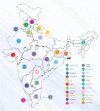Developing Standard Treatment Workflows-way to universal healthcare in India
- PMID: 37663866
- PMCID: PMC10472454
- DOI: 10.3389/fpubh.2023.1178160
Developing Standard Treatment Workflows-way to universal healthcare in India
Abstract
Primary healthcare caters to nearly 70% of the population in India and provides treatment for approximately 80-90% of common conditions. To achieve universal health coverage (UHC), the Indian healthcare system is gearing up by initiating several schemes such as National Health Protection Scheme, Ayushman Bharat, Nutrition Supplementation Schemes, and Inderdhanush Schemes. The healthcare delivery system is facing challenges such as irrational use of medicines, over- and under-diagnosis, high out-of-pocket expenditure, lack of targeted attention to preventive and promotive health services, and poor referral mechanisms. Healthcare providers are unable to keep pace with the volume of growing new scientific evidence and rising healthcare costs as the literature is not published at the same pace. In addition, there is a lack of common standard treatment guidelines, workflows, and reference manuals from the Government of India. Indian Council of Medical Research in collaboration with the National Health Authority, Govt. of India, and the WHO India country office has developed Standard Treatment Workflows (STWs) with the objective to be utilized at various levels of healthcare starting from primary to tertiary level care. A systematic approach was adopted to formulate the STWs. An advisory committee was constituted for planning and oversight of the process. Specialty experts' group for each specialty comprised of clinicians working at government and private medical colleges and hospitals. The expert groups prioritized the topics through extensive literature searches and meeting with different stakeholders. Then, the contents of each STW were finalized in the form of single-pager infographics. These STWs were further reviewed by an editorial committee before publication. Presently, 125 STWs pertaining to 23 specialties have been developed. It needs to be ensured that STWs are implemented effectively at all levels and ensure quality healthcare at an affordable cost as part of UHC.
Keywords: Standard Treatment Workflows (STWs); disease; public health; quality health care (QHC); universal health coverage (UHC).
Copyright © 2023 Grover, Bhargava, Srivastava, Sharma, Cherian, Tandon, Chandershekhar, Ofrin, Bekedam, Pandhi, Mukherjee, Dhaliwal, Singh, Rajshekhar, Roy, Rasaily, Saraf, Kumar, Parmar, Kabra, Chaudhry, Deorari, Tandon, Singh, Khaitan, Agrawala, Gupta, Goel, Bhansali, Dutta, Seth, Singh, Awasthi, Seth, Pandian, Jha, Dwivedi, Tripathi, Thakar, Jindal, Gangadhar, Bajaj, Kant and Chatterjee.
Conflict of interest statement
The authors declare that the research was conducted in the absence of any commercial or financial relationships that could be construed as a potential conflict of interest.
Figures
References
-
- Department of Health Human Services. Six Domains of Healthcare Quality. (2023). Available online at: https://www.ahrq.gov/talkingquality/measures/six-domains.html (accessed 16 January, 2023).
-
- McDonald KM, Sundaram V, Bravata DM, Lewis R, Lin N, Kraft S, et al. . Closing the Quality Gap: A Critical Analysis of Quality Improvement Strategies (Vol. 7: Care Coordination). Rockville, MD: Agency for Healthcare Research and Quality; (2007). Report No.: 04(07)-0051-7. - PubMed
MeSH terms
Grants and funding
LinkOut - more resources
Full Text Sources



